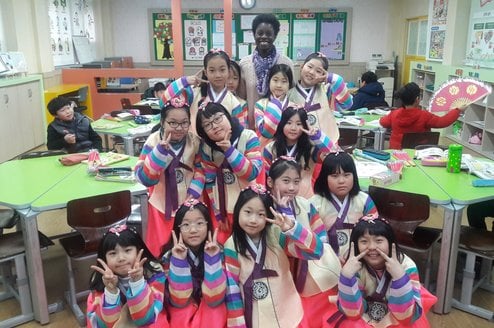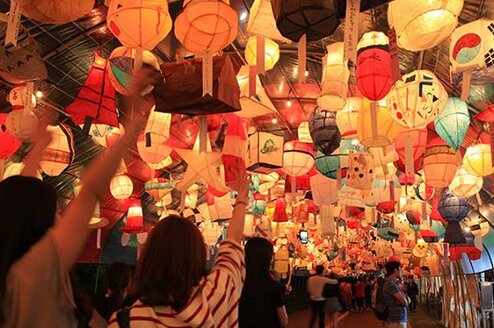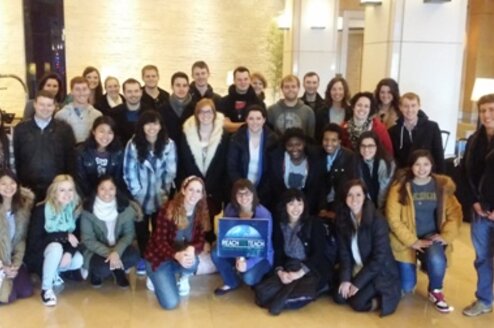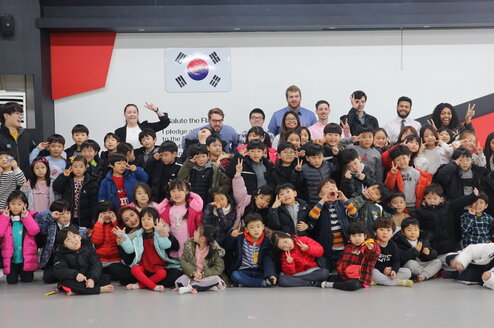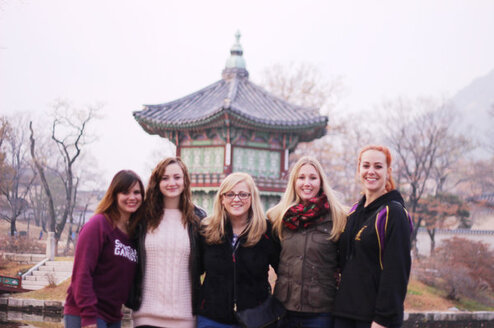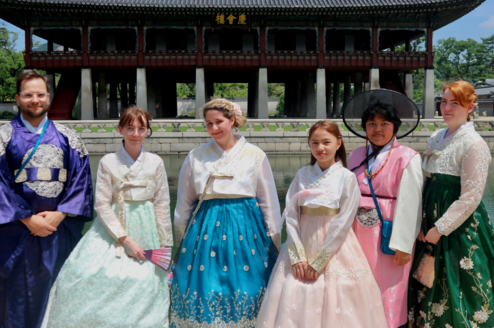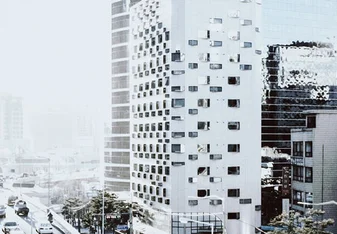Teach English in Busan, South Korea
About
The second-largest city in Korea, Busan (or Pusan) is another attractive option for young expats who want to teach English in Korea. Due to its location on the southeast corner of the Korean peninsula, Busan does at times have milder winters than the rest of the country. The “Korean summer capital” is the destination of choice on the peninsula to hit one of the country’s largest beaches, Haeundae Beach, as well as five other beaches.
For outdoor lovers, Busan’s mountain park, Geumjeongsan, is a very popular hiking destination. For movie buffs, Busan hosts an incredible international film festival (Busan International Film Festival). Do you like baseball? Busan is considered the baseball capital of Korea, as the home of professional league players, the Lotte Giants.
If you want to teach English in Busan, you will find yourself in a bustling port city with its own subway system, dynamic nightlife, beautiful beaches and temples, and festivals throughout the year. There are ample opportunities to teach at private language schools or hagwons, public schools through government programs, and universities. Busan is a city where you can still find some Western conveniences, and at the same time, you can enjoy the adventure of trying new things.
Types of Jobs Teaching English in Busan, South Korea
Government Sponsored Programs:
The EPIK program is the best way to get a job in a public school. You can apply directly on EPIK’s website or you can go through a recruiter, such as Reach to Teach. EPIK generally does a large round of hiring in February/March and in July/August, but bear in mind, Busan is perhaps the most requested location for teachers, so the competition will be fierce to get spots in Busan public schools.
Hours are from 8:30 am to 5:00 pm, Monday through Friday, with salaries between $1700 to $2300 USD per month. EPIK issues year-long contracts, with benefits including health insurance, visa sponsorship, and plenty of vacation days. These jobs are usually very stable, but they are competitive, so do your research and make sure your documents for the visa process are prepared in advance!
Private Language Academies/Schools:
Chungdahm and Avalon are the big chains of private language schools, or hagwons, that you will find in Busan, as well as in most of the major cities throughout South Korea. These schools hire year-round, and you can apply either through the school’s website, or a recruiter. If you prefer working in the afternoons and evenings, smaller class sizes, and with a staff of Koreans and other Westerners, a hagwon may have what you need. Remember as always to do your research and request if you can to contact any current or former foreign teachers to ask about their experiences.
International Schools:
Since Busan is a thriving port city, there is a large foreign community that needs education for their children. The Busan International Foreign School is accredited through International Baccalaureate and the Council of International Schools. If you have the proper certification from your home country and you want to teach outside of your home country in another culture, then an international school may be the adventure you are looking for. Check out the Council of International Schools for more information.
Universities:
After spending several years successfully teaching in public schools or hagwons, some English teachers go on to work as university employees. Busan has several colleges and universities. Pusan National University has a dynamic area with cafes, theatres, and cultural activities. Some Westerners may want to check out Busan University of Foreign Studies. University jobs in Korea are not always easy to find, but occasionally you can inquire through the university website or online forums. Universities prefer their teachers to already have experience teaching in Korea, and in most cases require a Master’s degree. These positions are sought-after, with decent pay and good benefits, including vacation time.
Finding a Job Teaching English Abroad in Busan, South Korea
When and Where to Look for Jobs:
Hagwons in Korea tend to hire year-round and those jobs are often posted online. If you are interested in working with EPIK, they usually hire in February and August, around the beginning of new school semesters. It’s advisable to prepare your EPIK application several months in advance.
There is a publication that is exclusive to jobs, events, and other activities for the Busan area called Busan Haps, written by expats for expats. It also provides links to other companies and blogs that can help job searches, real estate searches, and other goodies.
Qualifications:
To teach on the E-2 Visa, it is a requirement to have a Bachelor’s degree from an accredited university. Universities prefer their teachers to hold Master’s degrees, as well as prior experience teaching in Korea. EPIK prefers their teachers to have teaching credentials from their home countries or even a Master’s degree. Some schools also want teachers to have at least a 100-hour TEFL certification, with a classroom component.
What You Need to Know About Teaching English Abroad in Busan, South Korea
Salary & Cost of Living:
Busan is a little bit cheaper than Seoul in terms of cost of living. However, it is still a big city and considered one of the more expensive areas to live in Korea. Remember that one of the benefits of teaching English in Korea is that most schools provide rent-free accommodations for their teachers. English teachers also get paid a monthly salary of US$1500 to US$2000, or more depending on degrees and qualifications, so it is possible to sock away money if you’re not paying for rent. Busan has an active nightlife scene, especially around the universities. Like in Seoul, you can spend as little as US$0.88 or as much as US$13 on food. Depending on your lifestyle, you can save a great deal of money in Busan.
Classroom & Work Culture:
When it comes to getting along with your students and co-workers, there are some Korean rules of etiquette to follow.
- Student/Teacher Relations: Students are taught from a young age to be very respectful of authority figures, especially teachers. Due to a deep aspect of Asian culture known as “saving face,” students will not always tell the teacher directly if they don’t understand something. This also means that Korean co-workers will not engage in direct confrontation. Also, Korean society is very keen on students learning English, so it’s considered a valuable aspect of their education. Many students attend a full day of school, and then go to several hagwons during the week to improve their chances to enter the best high schools and universities, and the competition is fierce.
- Dress Code: Dress code among teachers can vary greatly, depending on the type of school. If you are teaching adults in a business setting, then you should wear business casual. Some hagwons request their teachers wear business casual. When in doubt, observe your co-workers, both Korean and Western, and follow along accordingly.
- Greetings: South Korea is a very modern country, so many Koreans do greet each other with a handshake. However, some prefer to greet with a traditional bow. Again, when in doubt, follow the lead of your co-workers or friends.
What People Are Saying
New Teaching Jobs
View the latest teaching job postings on our job board.
Related Teach Abroad Articles
Frequently Asked Questions
-
How do I become an English teacher in South Korea?
To become an English Teacher in South Korea you need to be a native English speaker from an approved country (for the E-2 visa), have a bachelor's degree, and pass a criminal background check. If you meet these qualifications, decide where you would like to teach (public school, international school, university, private academy) and apply to your preferred programs. Some good places to start are EPIK, Seoul Metropolitan Office of Education, and Go Overseas!
Related Content -
How much does an English teacher make in South Korea?
An English teacher's salary in South Korea can range between $1,350-$3,100 USD per month. Your salary range may change depending on if you teach at a public school, private school, university, or international school.
-
Can I teach in South Korea without a degree?
Generally, no. Most English teaching jobs need specific qualifications such as a completed bachelor’s degree. However, it's possible to find a few programs like TaLK that allow you to teach if you have an associate's degree or are in your third year (or higher) of college. If you are not a degree holder, you may still be able to get classroom experience by teaching through a volunteer program instead.
Related Content -
Is living in South Korea expensive?
Living costs in South Korea are pretty reasonable. To give you a general idea, here are a few cost of living prices: $2.75 for a beer, $6 for a meal at a restaurant, ~$1 per trip for public transportation, and between $350 to $675 USD per month to rent an apartment (depending on if it's rural or in a city).
-
Can you teach English in South Korea for 6 months?
Yes. Those looking to work at a private or public school can apply for a school-sponsored E-2 visa. This visa will grant you work rights in South Korea for up to a year.
Related Content
